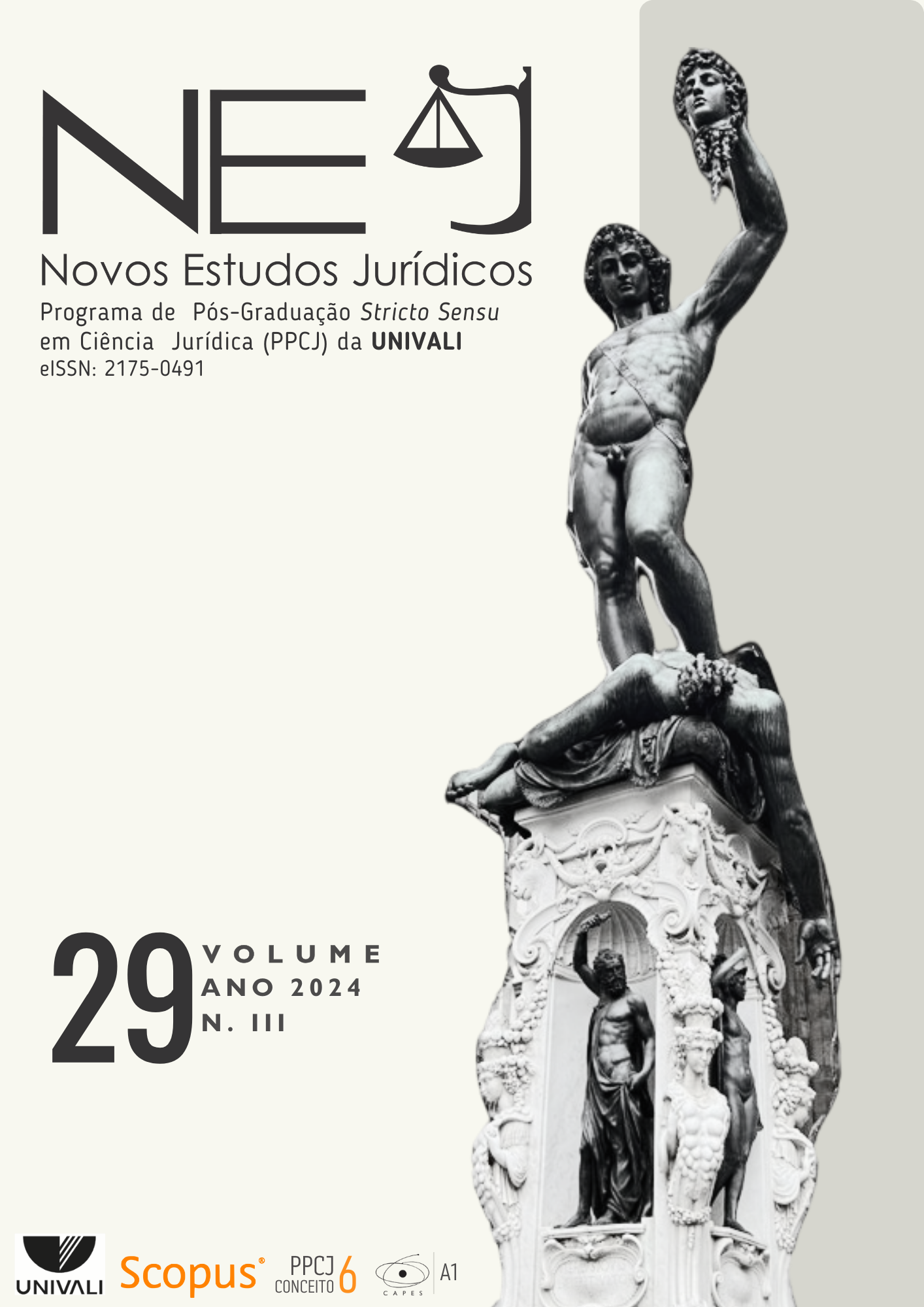UNDUE DELAYS IN THE IMPLIED PROCEEDINGS
DOI:
https://doi.org/10.14210/nej.v29n3.p751-779Keywords:
Judicial process, Statute of limitations, Extrajudicial claim, Undue delayAbstract
Contextualization: The basis of the legal recognition of the extrajudicial claim as a cause of interruption of the prescription of actions is called into question by the eventuality (not prohibited by the legal system) of the holder of the right indefinitely postponing the prescription by means of the repeated interposition of extrajudicial claims. This being the case, the uncertainty as to the time of the resolution of the dispute (which would remain entirely in the hands of the plaintiff) causes the taxpayer a particular situation of defenselessness. The apparent limitation of the prohibition of undue delays to the internal sphere (to the processing) of the process makes it difficult to eliminate the aforementioned distorting effect.
Objectives: : To include the repeated extrajudicial claim in the legal figure that makes possible the non-application of the effect of interruption of the statute of limitations.
Method: Methodology based on an interdisciplinary analysis of the doctrinal, normative and judicial foundations with a view to the proposal of consistently argued theses.
Results: The prohibition of undue delays has a general scope and is also projected on the process implicit in the very consideration of the institution of the statute of limitations and the causes of its interruption, a process taken into consideration by the holder of the right when he decides to postpone it indefinitely with the subterfuge of the repeated extrajudicial claim. At this point, it is necessary to consider the prohibition of undue delays in the implicit process as a legal basis for the judicial decision denying the interruption of the statute of limitations in the case in question.
Downloads
References
BELTRÁ CABELLO, Carlos. La prescripción extintiva. Plazo e interrupción, comentario a la STS de 25 de enero de 2017. Revista CEFLEGAL, n. 196, 2017.
CABANILLAS MÚGICA, Santiago. Comentario a los artículos 1961 a 1975. In: BERCOVITZ RODRÍGUEZ-CANO, Rodrigo (Director). Comentarios al Código Civil. Valencia: Tirant lo Blanch, 2013.
DÍAZ MAROTO Y VILLAREJO, Julio. El derecho a un proceso sin dilaciones indebidas. In: RODRÍGUEZ PIÑEIRO Y BRAVO FERRER, Miguel; CASAS BAHAMONDE, Mª Emilia (Directores). Comentarios a la Constitución Española XL Aniversario. Madrid: Fundación Wolters Kluwer, Boletín Oficial del Estado, Ministerio de Justicia, 2018.
DÍEZ-PICAZO, Luis. Ensayos jurídicos. Tomo I. Cizur Menor, Navarra: Civitas, Aranzadi, 2011.
ESPÍN LÓPEZ, Isidoro. El derecho a un proceso sin dilaciones indebidas en la práctica judicial española. Anales de Derecho, Universidad de Murcia, n. 35, 2/2017.
GARBERÍ LLOBREGAT, José. Constitución y derecho procesal. Los fundamentos procesales del derecho procesal. Madrid: Civitas, 2009.
MIRAUT MARTÍN, Laura. La implicación del concepto de probabilidad en el derecho. Murcia: Laborum, 2023.
MOREIRO, Carlos J. La invocación del plazo razonable ante el Tribunal de Justicia. Madrid: Dykinson, 2012.
ORTIZ GONZÁLEZ, Ángel Luis. Dilaciones indebidas en el proceso civil. Experiencias y propuestas del Defensor del Pueblo. In: AA.VV. El proceso en el siglo XXI y soluciones alternativas. Cizur Menor, Navarra: Thomson Aranzadi, 2006.
OUBIÑA BARBOLLA, Sabela. Dilaciones indebidas. Eunomía. Revista en cultura de la legalidad, n. 10, 2018.
PÉREZ UREÑA, Antonio Alberto. La interrupción de la prescripción extintiva por la reclamación extrajudicial. Revista de Jurisprudencia, diciembre 2016.
REGLERO CAMPOS, Fernando (atualizado por Pilar Domínguez). Artículos 1961 a 1975. In: BERCOVITZ RODRÍGUEZ-CANO, Rodrigo (Coordinador). Comentarios al Código Civil. 4. ed. Cizur Menor, Navarra: Thomson Reuters, Aranzadi, 2013.
RODÉS MATEU, Adriá. El derecho a un proceso sin dilaciones indebidas. Estudio de su configuración constitucional y de su restablecimiento en el ordenamiento jurídico español. Barcelona: Atelier, 2009.
Downloads
Published
How to Cite
Issue
Section
License
Na qualidade de autor(es) da colaboração, original e inédita, sobre o qual me(nos) responsabilizo(amos) civil e penalmente pelo seu conteúdo, após ter lido as diretrizes para autores, concordado(amos) plenamente com as Políticas Editorias da Revista Novos Estudos Jurídicos - NEJ e autorizo(amos) a publicação na rede mundial de computadores (Internet), permitindo, também, que sua linguagem possa ser reformulada, caso seja necessário, sem que me(nos) seja devido qualquer pagamento a título de direitos autorais, podendo qualquer interessado acessá-lo e/ou reproduzi-lo mediante download, desde que a reprodução e/ou publicação obedeçam as normas da ABNT e tenham a finalidade exclusiva de uso por quem a consulta a título de divulgação da produção acadêmico científico.





























